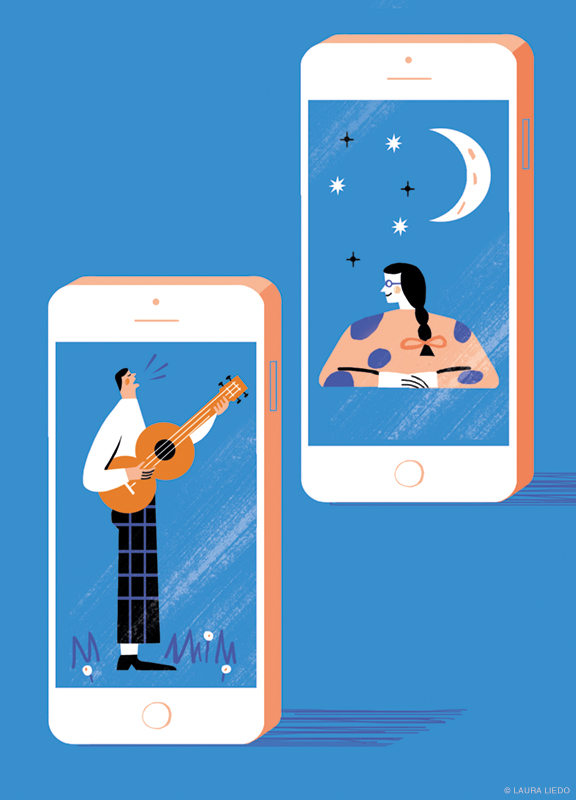
How the pandemic is changing the future of romance.
By Mia Levitin
As life went even more digital during lockdown, the inversion we had been heading towards for over a decade was nearly complete: many of us in the West had gone from a life engaged in the world interspersed with screen time to existing almost entirely online, with the outside world a place to dip into from time to time. Seduction took a strange twist, as physical intimacy became potentially perilous for the first time since the AIDS epidemic, leading singles to date fewer people at a time and have exclusivity conversations sooner.
Government guidelines on sex during lockdown varied by geography. The Dutch were counseled to limit themselves to one seksbuddy. Single Brits pored over the rules in search of a loophole (outdoor orgies?) until “support bubbles” effectively lifted the sex ban. Officials in New York and LA began by preaching abstinence: “You are your safest sex partner,” wrote the New York Department of Health, and the “next safest partner” is someone in your household. The guidelines were later updated to acknowledge interhousehold activity by recommending wearing face masks and avoiding kissing for safer sex. “Make it a little kinky,” suggested their COVID-19 factsheet. “Be creative with sexual positions and physical barriers, like walls, that allow sexual contact while preventing close face-to-face contact.”
For those not busy building state-sanctioned glory holes, dating app traffic soared during lockdown. Tinder had 3 billion Swipes® (yes, it’s actually a registered trademark) on March 29 alone, the highest number recorded in the app’s history. The daily average swipes of female users under 30 were up 37 percent, which got its parent company, Match Group, excited: “Female usage and engagement is a key driver for a dating product’s success,” they told shareholders. OkCupid also noted an uptick, with women sending 40 percent more intro messages than previously.
In light of rules around social distancing, the pandemic ushered in a new era of video dating. Bumble’s in-app video chatting, a feature many users didn’t even know existed, increased 93 percent in the two weeks after President Trump declared a national emergency. Hinge also introduced a “date from home” feature to indicate if matches were up for a video chat or phone call. Teams at both Tinder and Facebook Dating got busy adding video functionality to their platforms to accommodate the surge in interest. By adding the dimensions of voice and mannerisms, video is one step closer to sussing out what it’s like to be with someone. Provided the apps could screen for safety—i.e., it didn’t devolve into Chatroulette—some users planned to continue using video as a way to screen dates before meeting face to face.
As physical borders contracted, the digital dating universe expanded: Bumble let people match with anyone in their country and Tinder offered its premium Passport function—traditionally used by people to line up dates before traveling—for free during lockdown. Airbnb and Bumble teamed up to curate virtual first dates in exotic locales, from a Turkish coffee-grind reading (hopefully predicting a wonderful future together) to “Meet the Woolly Sheep of My New Zealand Farm.” Virtual Reality Looking For Partner (VRLFP)—“a community for people interested in dating, hookups, friendship and/or roleplaying in virtual reality”—left the physical plane behind altogether. VR porn also saw increased traffic, offering experiences in places people missed: outdoors, abroad, in restaurants and, yes, hair salons.
Many commentators highlighted the positive aspects of distance-dating, praising the slow burn of delaying physical intimacy, deeper conversations around safety, and longing associated with separation. If one positive thing came out of lockdown with regard to seduction, people realized how much they missed human touch. Some singles complained of increased aggressivity, however, with a ramp-up in unsolicited nudes and pressure to break lockdown rules to meet up. Others wondered whether video chatting with people in far-flung locations, whom they had no chance of meeting anytime soon, was yet another way of avoiding intimacy. In its roundup of pandemic dating alternatives, Time Out London kept it real: “None of them is as good as going to the pub for a couple of drinks and then going back to theirs.”
Even before opportunities for in-person encounters dwindled, dating apps were a booming business. According to the analytics firm App Annie, dating app spending doubled in the past two years, to $2.2 billion globally in 2019. Tinder, the market leader, is the highest-grossing non-gaming app, with an impressive $1.4 billion of revenue expected in 2020. Despite the seeming sexual smorgasbord on offer on apps, however, a 2019 Pew survey showed that 67 percent of singletons surveyed were dissatisfied with their dating lives and 75 percent were finding it difficult to meet people to date.
The popularity of apps has posed a challenge to other dating businesses. A matchmaker at a high-end agency told me that her clients, who were always demanding given the hefty fee of the service, come in with ever-longer laundry lists of must-haves and deal-breakers. The shutting down of Guardian Soulmates, a paid service that had been a mainstay of UK dating since 2004, was a direct casualty of free apps. Zoe Strimpel, the author of Seeking Love in Modern Britain, called the demise of Soulmates “an epic final nail in the coffin of the old era of courtship.”
Habituated to the safety of screens, people are increasingly unpracticed at unmediated seduction. The social anthropologist Jean Smith told me that some participants in a masterclass she taught on flirtation asked her to set up an online forum so they could “wink” at those whom they had been too shy to approach during the cocktail hour. This, having just dedicated hours to developing that very skill! Despite the prevalence of dating apps, a full 84 percent of millennials surveyed said they would still prefer to meet someone organically. And yet they fear they are losing the aptitude to do so: a School of Life class I attended on the art of conversation was filled with participants who felt unable to relay their text selves into real life. Northwestern University’s class on intimacy is dubbed “the most popular course on campus.” One of the assignments? Asking someone out on a date.
As I learned from one of Smith’s “fearless flirtation” courses, striking up conversations IRL can be as simple as asking a question to establish rapport, e.g., “Can you recommend a beer on tap?” The revelation is that if someone is interested in talking to you, the opening gambit does not matter a lick. If they’re not interested, you respectfully retreat. A smile is a low-cost investment: if it goes unreturned, what, really, have you lost? Flirtation doesn’t even have to have sexual undertones or romantic intent; at its base, it is nothing more than cultivating a sense of playfulness and openness to the possibilities of conversation. (You might discover a new lager!) There are plenty of people out there in the wild, it turns out, if we just lift our heads and take out our AirPods long enough to notice.
So what will courtship look like when singletons emerge from their caves—eyes blinking to adjust to the sun—as it becomes safe to go out again? The pandemic has given us occasion to pause and consider how it is we want to live, at a moment when we have reached the apotheosis of individualism. We can rethink our approach to social care, healthcare, and the environment, or we can revert to the old normal. We can engage in the world and the people who populate it, in all of their glorious messiness, or spend our one wild and precious life swiping them away. Choose your own adventure.
Mia Levitin W’97 is the author of The Future of Seduction, from which this essay is adapted with the permission of Unbound.




